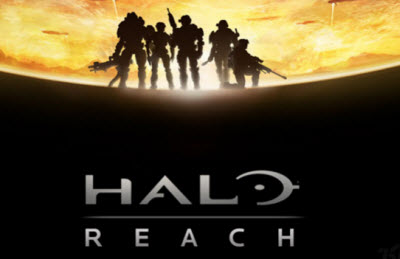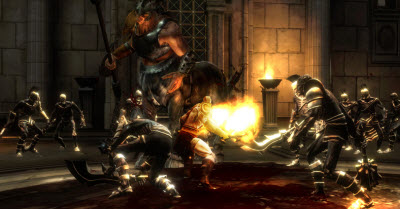 After an eight percent dip last year, the U.S. console video game business is turning to green-clad heroes and familiar names in 2010 to galvanize sales. Namely Halo: Reach, Final Fantasy XIII, and possibly a new Zelda. In other words, hardcore games are expected to come roaring back this year.
After an eight percent dip last year, the U.S. console video game business is turning to green-clad heroes and familiar names in 2010 to galvanize sales. Namely Halo: Reach, Final Fantasy XIII, and possibly a new Zelda. In other words, hardcore games are expected to come roaring back this year.
“Many of the games generating excitement are sequels to existing games that have performed well in the past,” says John Davison, content director for GamePro. “These games also have the advantage of iterating upon, and refining concepts that have already been tested and well-received.”
U.S. console game sales held up well in the recession through March, 2009. But after that, difficult comparisons to the blockbuster game releases of 2008 made it all but impossible for monthly game industry sales to beat their year ago figures. By April, NPD market research sales numbers could show improvements over year ago figures. Anita Frazier, an analyst at NPD, expects that software sales in 2010 will top the 2009 numbers, but the overall number is hard to predict because of variations in hardware revenues which could come if the console makers cut prices. She notes that a comeback in hardcore game sales could generate more revenue because hardcore games carry higher prices than more casual titles.
It won’t be an easy year. Electronic Arts and Activision Blizzard are both forecasting that overall console game sales in the industry will be down slightly in the coming year. They may be overly cautious. What’s more, the explosion of free or casual games on new platforms such as Facebook, the iPhone, and free-to-play web sites — not to mention sales of used games — will continue to undermine demand for $60 console games.
AI Weekly
The must-read newsletter for AI and Big Data industry written by Khari Johnson, Kyle Wiggers, and Seth Colaner.
Included with VentureBeat Insider and VentureBeat VIP memberships.
 The big question facing the industry is whether gamers are going to continue to shift to those new platforms and embrace virtual goods transactions at cheaper prices, or if the core games will make their comeback. Every game company has begun to hedge its bets by investing in digital games. EA, for its part, noted that overall game industry sales will grow in 2010 if digital games are taken into account. By 2011, the number of digital games is expected to exceed the number of games sold in retail stores, according to market analyst Electronic Entertainment Design and Research (EEDAR).
The big question facing the industry is whether gamers are going to continue to shift to those new platforms and embrace virtual goods transactions at cheaper prices, or if the core games will make their comeback. Every game company has begun to hedge its bets by investing in digital games. EA, for its part, noted that overall game industry sales will grow in 2010 if digital games are taken into account. By 2011, the number of digital games is expected to exceed the number of games sold in retail stores, according to market analyst Electronic Entertainment Design and Research (EEDAR).
Still, the case for a hardcore comeback is tangible. In addition to the aforementioned Halo, Final Fantasy, and Zelda, there’s also Gran Turismo 5, God of War 3, Alan Wake and Super Mario Galaxy 2 planned for release this year. Plus, a new Metroid, Castlevania, Prince of Persia, Max Payne, Medal of Honor, Lost Planet and 2D Sonic The Hedgehog to boot.
“They’re coming thick and fast,” says Davison, noting the big games already released this year: Mass Effect 2, BioShock 2, MAG, and No More Heroes 2. And the list just keeps going. “Seriously, the number of ‘gamers’ games’ this year is ridiculous,” adds Tim Williams, an avid player from Los Angeles. “I’ve never seen anything like it.”
The console makers are expected to cut hardware prices once again to spur demand as they bring the costs of making consoles down. At this point in the lifecyle of the current generation consoles, prices for each console from Nintendo, Microsoft and Sony are extraordinarily high compared to past cycles. If prices are cut, that will have an immediate effect of lowering hardware revenue, making it harder to beat year ago prices. But the hardware price cuts could also spur an increase in demand for software.
Game prices are also under pressure, thanks to heavy promotions by retailers, both online and offline. In this generation of game consoles, prices actually rose from $49 to $59 (for PS 3 and Xbox 360 games), and those higher prices have held up longer than expected. But during the holidays, retailers such as Wal-Mart, Toys ‘R Us and Best Buy seem determined to offer price discounts to gain market share in games, analysts say, while Amazon.com is also pushing prices for new games lower lately.
On the PC side, “There are some big-name franchises getting sequels too,” says Davison. To wit: Starcraft II, World of Warcraft: Cataclysm, Crysis 2, and a port of last year’s critically acclaimed Assassin’s Creed 2 for consoles.
 To be clear, epic-length games never went away. They just had the spotlight taken from them in recent years as publishers focused on making party games like Wii Sports and Rock Band to meet rising demand from casual players. The strategy worked—until those same fickle consumers tightened their belts during recession last year, something die-hard gamers rarely (if ever) seem to do, since they’re always looking for their next fix.
To be clear, epic-length games never went away. They just had the spotlight taken from them in recent years as publishers focused on making party games like Wii Sports and Rock Band to meet rising demand from casual players. The strategy worked—until those same fickle consumers tightened their belts during recession last year, something die-hard gamers rarely (if ever) seem to do, since they’re always looking for their next fix.
As a result, analysts expect sizable drops in the supply of lighthearted games this year. “Music and casual products will face the biggest declines,” says Jesse Divnich of EEDAR. Conversely, he says, “Core genres such as action and shooters are expected to rise double digits over last year.”
Music games were significant in recent years because they brought new players to the consoles. Back in 2006, when Guitar Hero debuted, 14 music games were launched. Guitar Hero became a billion-dollar franchise, and, supplemented by competition from Rock Band, inspired lots of copycats. By 2009, 81 music games were released on the consoles. But music game sales dropped off in a big way during the holidays, prompting Activision Blizzard to lay off lots of its music game developers.
This isn’t to say so-called “casual” games have died either. They remain an obvious and large part of the pie, especially in terms of opportunity. It’s just the honeymoon is over. As a testament to this, both Microsoft and Sony will release Wii-like (but optional) motion controllers this year “to soften the image” of their respective consoles, Davison says. In other words, try to get in on the action Nintendo’s been enjoying for the last four years.
But outside of their separate releases later this year, and their build-up at this summer’s Electronic Entertainment Expo, core game releases will dominate headlines for most of the year. Some of these games were deliberately delayed to avoid competing with Activision Blizzard’s Modern Warfare 2, which generated $1 billion plus in sales since its launch in November. And many of the planned 2009 games were delayed so they could be finished properly and launched in 2010.
So will these hardcore games have the desired effect on sales? EEDAR noted that the number of games coming out this year is beginning to contract. In 2009, there were roughly twice as many console games launched as there were back in 2004. One of the problems of 2009 was that there were too many titles coming out, but the revenues were concentrated in only the top 20 games. Now, the talk in the market at companies such as EA is to launch fewer, higher-quality games. But the number of games still needs to come down, said Greg Short, president of EEDAR.
“One out of five games delivering a significant profit is not sustainable,” he said at the recent Dice Summit.
Financial analyst Michael Pachter says yes, pointing to the numerous high-profile games in the pipeline. “I haven’t finished my forecast, but it looks like the industry will grow by 7-10 percent this year,” he predicts. “The hardcore gamer will reinvigorate sales, and we will all be pleasantly surprised by growth by the middle of the year.”
EEDAR’s Divnich isn’t so sure, predicting further discounts on hardware (good news for gamers) at the expense of lower total revenues (bad news for publishers). As a result, EEDAR expects total sales to decline “in the low single digits” this year, even though they expect software sales to increase, as Pachter believes.
By the fall, Microsoft’s Project Natal and Sony’s Arc — two new gesture-control systems for the consoles — could spur new demand, NPD’s Frazier said. Retailers are hopeful that both Sony and Microsoft will have plenty of supplies on hand. On the casual side, Apple will release its new iPad, which will draw new kinds of games to its platform.
Whatever the commercial effect, long-time gamers will undoubtedly win this year, provided the big games live up to their reputation. But with so many options, basic math puts the odds in players’ favor—it’s gonna be a good year.
The only thing gamers have to worry about is how they’re going to pay for all this stuff.
 Please check out our GamesBeat@GDC executive game conference at the Game Developers Conference on March 10. And if you’re a game entrepreneur, consider entering the Who’s Got Game contest for best game startup. Finalists will go up on stage at GamesBeat@GDC.
Please check out our GamesBeat@GDC executive game conference at the Game Developers Conference on March 10. And if you’re a game entrepreneur, consider entering the Who’s Got Game contest for best game startup. Finalists will go up on stage at GamesBeat@GDC.
VentureBeat's mission is to be a digital town square for technical decision-makers to gain knowledge about transformative enterprise technology and transact. Learn More